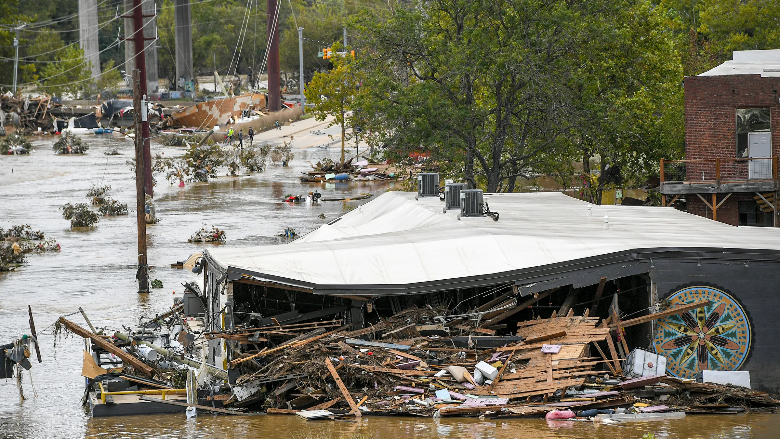In the small town of Bat Cave, North Carolina, residents are grappling with the overwhelming devastation left in the wake of Hurricane Helene. The Category 4 storm, which ripped through the Southeast, has left the town in ruins and its residents struggling to rebuild. But despite their desperate pleas for federal assistance, the Federal Emergency Management Agency (FEMA) has been noticeably absent, leaving the townspeople feeling abandoned by the very agency meant to help in times of crisis.
For the 180 residents who call Bat Cave home, the storm has been nothing short of catastrophic. The Broad River, once a modest 10-yard-wide stream, has morphed into a 100-yard-wide riverbed filled with debris, fallen trees, concrete slabs, and downed powerlines. Homes that once lined its banks have been either swept away or are teetering on the edge of collapse, threatening to fall into the swollen waters at any moment.
Chelsea Atkins, 38, a resident of Bat Cave, has been vocal about her frustrations with FEMA. She described a maddening experience in which the agency’s bureaucratic hurdles prevented them from providing aid to her storm-ravaged home. “FEMA called me and told me they wanted to inspect my house,” she explained to The New York Post, “but then they called me back to say they couldn’t drive around the ‘road closed’ sign. They weren’t allowed.”
The road, which The New York Post was able to navigate, had been temporarily blocked, but that didn’t stop Atkins or other residents from pushing forward with recovery efforts. Unfortunately, FEMA’s red tape did.
While some elderly and sick residents were airlifted to safety shortly after the hurricane hit, those who stayed behind in Bat Cave have seen little to no government assistance. The town has been largely left to fend for itself, with the few visible law enforcement officers being Louisiana State Police troopers who, according to locals, have done little more than “keep an eye on everything.”
In stark contrast to other devastated areas of western North Carolina, where military helicopters and federal resources have been actively helping recovery efforts, Bat Cave’s progress has come almost entirely from the resilience and resourcefulness of its community. Local workers, including apple orchard employees and a grading contractor, took matters into their own hands, clearing debris-strewn roads long before the state’s Department of Transportation (DOT) arrived to assist. Once DOT finally showed up, the heavy lifting had already been done by the residents.
Atkins, originally from Buffalo, New York, recounted the terrifying moments when Hurricane Helene hit. She and her husband, Andy Wells, 40, had sought refuge with neighbors in a small post office building across Highway 64. “It was wild,” she recalled, as floodwaters rose and the group was forced to move to higher ground. Even then, their safety was not guaranteed. One home they were near had a gas leak, and the ground beneath another was literally slipping away.
Despite the damage and chaos, FEMA has yet to provide meaningful support. Atkins said FEMA had scheduled an inspection of her home, which was heavily damaged in the storm, but they never showed up—citing the closed road as the reason. “The DOT’s been here, and random fire departments, like Kannapolis. They were great,” she said. “But nobody’s been bringing in supplies except civilians.”
Curtis McCart, a retired Los Angeles fire captain and paramedic, echoed Atkins’ frustrations. McCart estimated that at least a dozen homes along his stretch of Highway 64 had been completely washed away by the storm. Like Atkins, he has yet to see any FEMA personnel and expressed concerns that their eventual arrival might be too little, too late. “At this point, I don’t care if FEMA comes by. I don’t want somebody to pull me out of here, saying I’m working in an unsafe spot,” he said.
The small town has been effectively split in half after a 15-foot segment of the bridge that connects both sides of Bat Cave was destroyed in the hurricane. While residents have managed to cover the gap with a makeshift sheet metal bridge, it can only support foot traffic, forcing them to risk crossing the dangerous structure on foot.
Hurricane Helene, now considered the deadliest U.S. mainland hurricane since Hurricane Katrina in 2005, has claimed the lives of at least 232 people across the Southeast, with hundreds still missing. The devastation has been widespread, but for the residents of Bat Cave, the absence of federal assistance adds insult to injury.
As the town continues its recovery efforts, many residents are left wondering if FEMA will ever arrive to help. Or, if like so many other small communities, they will be forced to rebuild on their own, with only the support of their neighbors and the determination to restore their lives after the storm.



